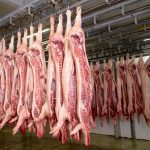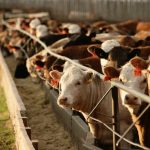Chicago Mercantile Exchange (CME) live and feeder cattle futures bounced on Friday as strong cash prices buoyed futures markets, traders said.
Tag Archives prices

U.S. livestock: Cattle and hog futures up on strong wholesale prices

U.S. grains: Corn futures turn higher on surprise old-crop stocks forecast
Chicago Board of Trade corn futures rebounded off of multi-year lows on Friday, and soybean futures briefly turned higher, as a government report forecast tighter stocks than traders had expected.

U.S. grains: Wheat, corn and soybeans rebound ahead of data
Chicago wheat, corn and soybean futures regained ground on Thursday after Wednesday's dramatic losses as investors covered short positions ahead of the U.S. Department of Agriculture's supply and demand report set to be released on Friday.

U.S. livestock: Lean hogs, feeder cattle turn higher on bargain buying
Chicago Mercantile Exchange (CME) lean hog futures turned higher on Thursday on a spate of bargain-buying, after the most-active August contract LHQ24 set a new low during the session, traders said.

U.S. livestock: Hog futures close down the daily limit on oversupply
CME lean hog futures LHQ24 closed limit down on Wednesday as a hefty oversupply and weak demand from consumers dragged futures lower, traders said.

U.S. grains: Soy futures fall to 2020 low on strong US crop prospects
Chicago Board of Trade soybean futures fell to a 2020 low on Wednesday, while corn hovered near a four-year low as favorable U.S. crop conditions kept a lid on prices.

CBOT weekly: Good weather leads to new lows in Chicago soybeans and corn
Soybean and corn futures at the Chicago Board of Trade fell to fresh contract lows in early July, as relatively favourable growing conditions and bearish technical signals weighed on values.

U.S. livestock: Cattle futures lower on dip in consumer demand
CME live and feeder cattle futures turned lower on Tuesday as cutout values fell and consumer demand waned following the end of major steak-eating holidays, traders said.

U.S. grains: Wheat, corn recover after slide; soy hits 2020 low
Chicago wheat and corn futures ticked higher on Tuesday after sharp declines on Monday, while most-active soybean futures closed at their lowest point in nearly four years, as expectations of ample supplies from northern hemisphere harvests hung over the market.

Klassen: Buyers tasting feeder cattle prices for fall run
For the week ending July 2, Western Canadian yearling prices were steady to $5 higher compared to seven days earlier for larger packages. Small groups of 800-pound-plus cattle were $10 to $15 discounted to pen-sized lots. Calf markets were relatively unchanged from the prior week, although volume was limited. There is significant open demand for yearlings and finishing feedlot operators are watching how prices develop.

